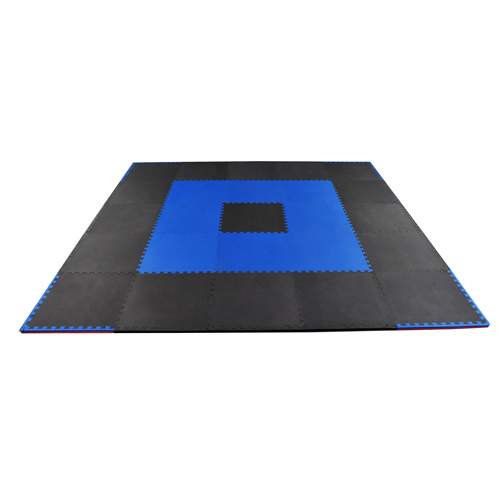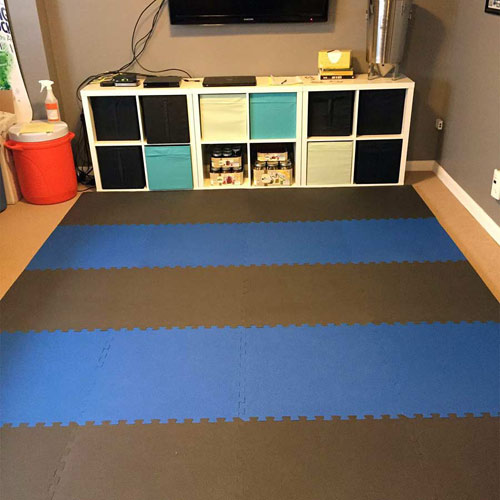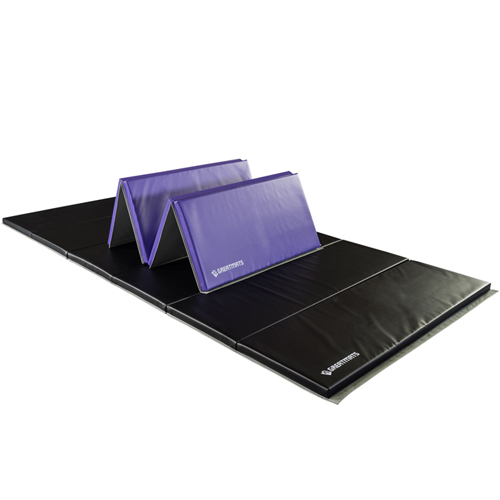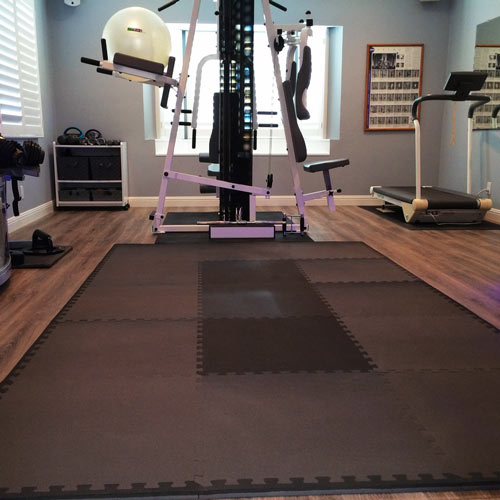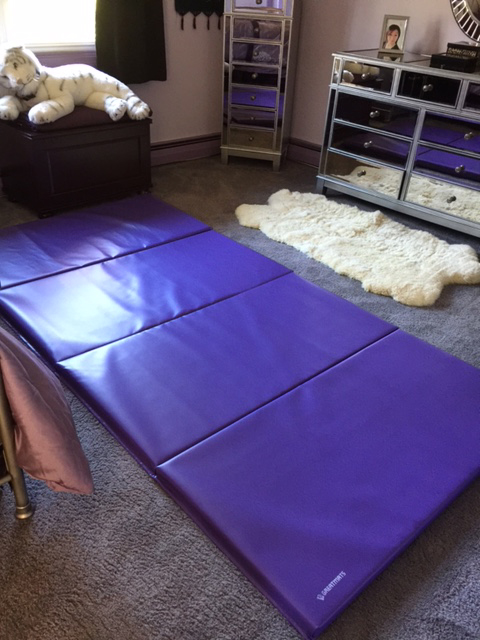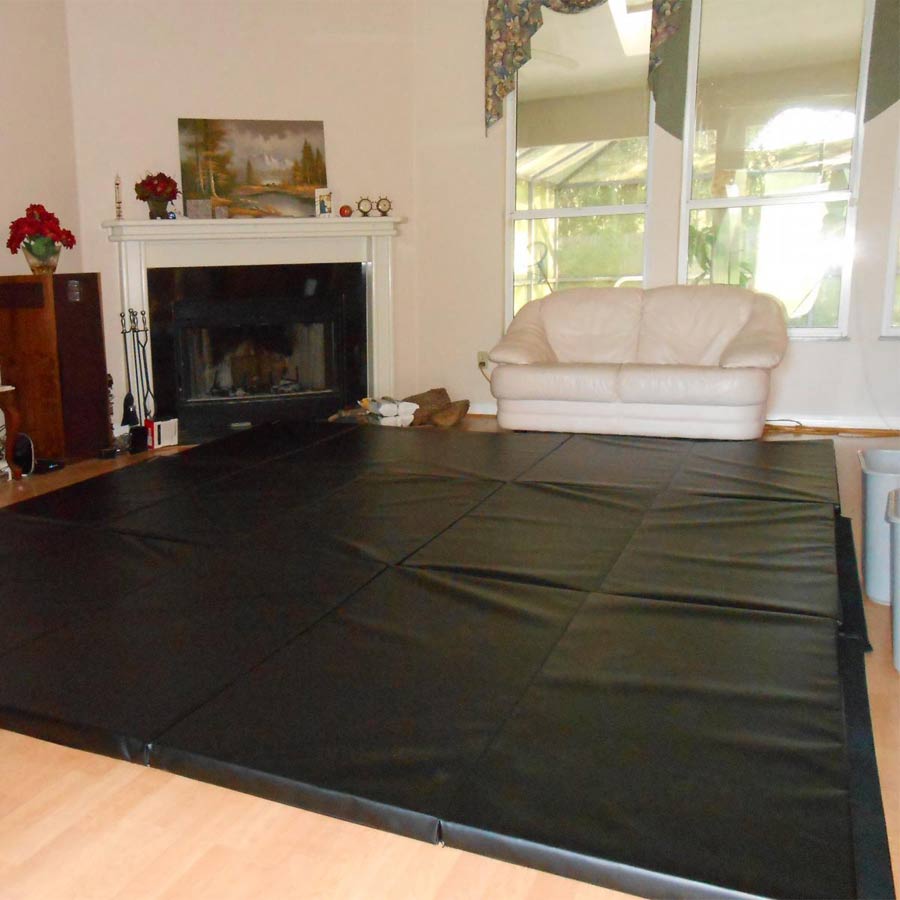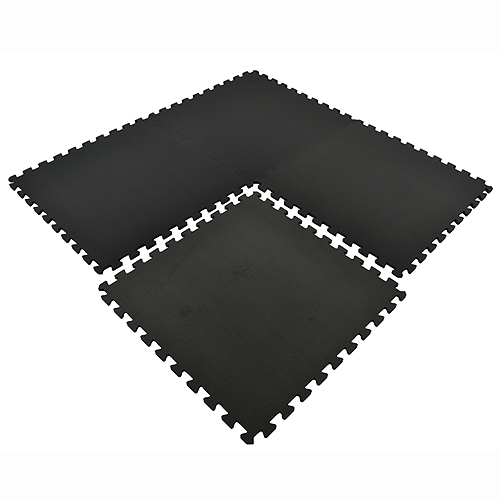What Are the Best Mats for Online Pilates Classes?
Related Product: Gym Floor Workout Fitness Tile Pebble 3/4 Inch x 2x2 Ft.
Some of the best mats for taking virtual Pilates classes at home include:
- Pebble Home Gym Flooring Tiles
- Sport Plus Designer Foam Tiles
- Premium Foam Kids and Gym Mats
- Home Sport and Play Mats
- Pebble Gym Floor Workout Fitness Tiles
- Fold-Up Gymnastic Mat
What Types of Floors Work Well for Virtual Pilates Classes?
Much of the Pilates workout involves being on the ground near the floor. This makes it key to have the right amount of support in the flooring, while also receiving cushioning properties. The floors need to consist of safe materials, such as EVA foam, which is free from latex and lead.With Pilates, the athlete creates the resistance by supporting the body against the floor (and gravity). This can strengthen the ab muscles, which will improve overall body strength, giving athletes the balance and coordination they need for almost any kind of activity.
Working against a firm floor can be extremely hard on the joints of the athletes during this type of workout. Additionally, some forms of Pilates, such as POP, Reformer, and Winsor, require intense movements and skills, necessitating a thicker level of cushioning than a general style of Pilates aimed at beginners.
Certain types of Pilates rely on machines or on specialized equipment, such as a chair, a ball, an exercise ring, or a barre. The flooring needs to be able to handle any equipment, including Pilates Power Gym equipment, without suffering permanent dents or damage.
Ultimately, floors that have a mixture of cushioning, durability, and stability will deliver the greatest results for online Pilates classes. The above mentioned foam mats and tiles for sale will yield the results athletes are seeking from these types of exercises.
What Are Some Advantages of Thin Foam Flooring for Online Pilates Classes?
Thin flooring is helpful for those who are looking for the maximum level of stability and traction during the Pilates workouts. Thinner flooring works best for athletes who may not need as much cushioning, because they’re typically doing beginner-level workouts.Another advantage of thinner interlocking foam tiles for at-home virtual Pilates classes is that they are lightweight and easy to assemble and disassemble as needed. For those who are laying out the tiles in the home’s media room to take a Pilates class over a YouTube video, putting the lightweight tiles together is an easier process than with a heavier type of flooring.
 Measuring about 3/8 inches in thickness, the Pebble Home Gym Flooring Tiles represent a good starting point for those looking to create a professional studio style of flooring inside the house. Each tile measures 2x2 feet, which makes the installation process go quickly.
Measuring about 3/8 inches in thickness, the Pebble Home Gym Flooring Tiles represent a good starting point for those looking to create a professional studio style of flooring inside the house. Each tile measures 2x2 feet, which makes the installation process go quickly.
These EVA foam floors are available in either black or gray. They feature a pebble texture top surface, which makes them ideal in a hot Pilates session, where sweat could make some floors slippery. Or if the athlete will be wearing socks for the workout, the chances of slipping are lower with the textured surface area versus a slick, flat surface.
These tiles will not soak up moisture, which can be helpful at home, where spilled water is always a possibility, especially if the kids will be around.
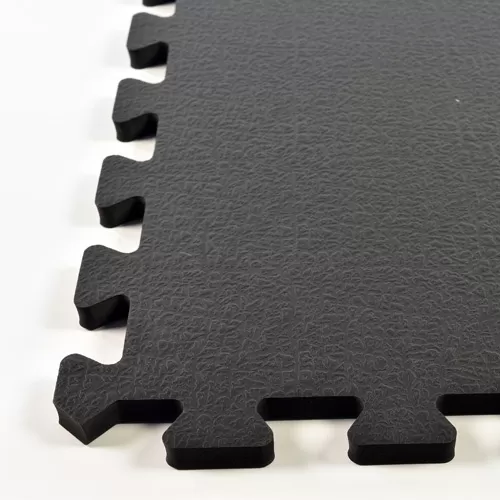 Both the Pebble Top tiles and the Sport Plus Designer Foam Tiles measure 3/8 inches in thickness and make use of interlocking edges that resemble jigsaw puzzles. With these edges, the tiles fit together tightly without the need for adhesive, which makes it easy to take them apart after the class finishes.
Both the Pebble Top tiles and the Sport Plus Designer Foam Tiles measure 3/8 inches in thickness and make use of interlocking edges that resemble jigsaw puzzles. With these edges, the tiles fit together tightly without the need for adhesive, which makes it easy to take them apart after the class finishes.
The Sport Plus tile is available in an all-black design, which nicely hides the puzzle-style edge after finishing the entire floor layout. This EVA foam tile has a slightly denser design than the pebble top tile, so it will work a little better for supporting Pilates equipment (although both styles have a higher level of density than the average EVA foam athletic tile).
Each Sport Plus tile measures about 2 by 2 feet, so it won’t take long to create the flooring layout for the online Pilates classes in a basement, spare bedroom, or media room.
Will Thicker Foam Tiles Work for Taking Pilates at Home?
For those who want extra cushioning in the flooring for taking virtual Pilates classes, look for a type of EVA foam that measures between 1/2 and 1 inch in thickness. Some EVA foam flooring options in this thickness range will deliver greater levels of density, while others focus on providing cushioning.Think about whether cushioning for hardcore workouts or a dense design for supporting furniture and equipment will be the better choice for these types of virtual Pilates classes. Then select the kind of interlocking foam tiles that match those needs.
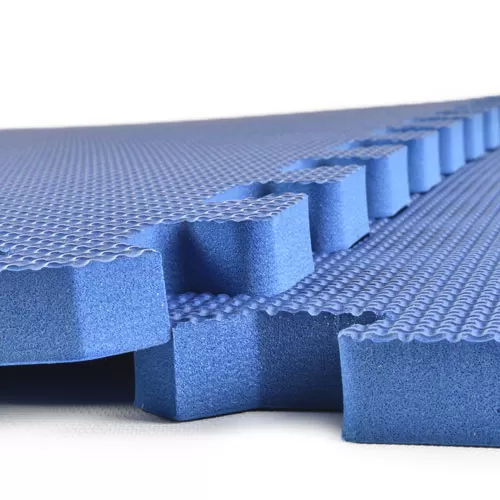 At 5/8 inches in thickness, the Premium Foam Kids and Gym Mats have a softer design than some others, providing a high level of cushioning. The cushion will keep the lower body joints of the athlete feeling fresh, allowing for longer workout sessions that occur several times a week, rather than needing multiple days off to deal with sore legs, knees, ankles, and hips.
At 5/8 inches in thickness, the Premium Foam Kids and Gym Mats have a softer design than some others, providing a high level of cushioning. The cushion will keep the lower body joints of the athlete feeling fresh, allowing for longer workout sessions that occur several times a week, rather than needing multiple days off to deal with sore legs, knees, ankles, and hips.
These colorful tiles may work well as both flooring for Pilates and for a child’s playroom, meaning regular assembly and disassembly of the tiles may not be necessary. With the extra softness in this style of tile, it can help protect toddlers from injury if they run and fall in the playroom.
Customer Rick uses these tiles in a basement, providing a cushioned floor that’s tough enough to stand up to Pilates workouts performed in sneakers.
Another customer, Nick, runs a Pilates studio where customers only use bare feet on the equipment, and these tiles yield the necessary level of comfort.
Each 2-by-2-foot tile uses an interlocking puzzle style edge to ensure a tight fit that will not pull apart under the stress of a Pilates workout. There’s no need to add adhesive to the puzzle edges.
 A tile with a slightly higher level of cushioning that works for online Pilates classes is the Home Sport and Play Mats product. This model measures 3/4 inches in thickness, providing plenty of cushioning, while also delivering a great density rating.
A tile with a slightly higher level of cushioning that works for online Pilates classes is the Home Sport and Play Mats product. This model measures 3/4 inches in thickness, providing plenty of cushioning, while also delivering a great density rating.
Greatmats customer Christine of Naperville, Ill., created a comfortable layout for Pilates over a basement floor with these tiles.
Another customer, Sara of Grand Island, N.Y., also uses these mats for Pilates on a basement floor, working out comfortably in bare feet.
Even with the added cushioning, the EVA foam has just enough firmness to create the perfect setting for Pilates workouts. It also has a high level of durability, so athletes can use it over and over for Pilates exercises.
A single mat measures 2 by 2 feet in size, so the layout goes fast. One thick mat weighs only 2 pounds, which simplifies the process of moving these tiles back and forth from the workout room to the storage closet.
This is a reversible style of flooring with different colors on either side. Should one side become damaged, just flip the tile over and use the other side, which lengthens the lifespan of the product. The interlocking edges on each color of tile will match up, so installers can mix up the colors if they want. The reversible color combinations include red and blue, black and gray, and green and brown.
Each tile has a thatch pattern, which creates the perfect texture for Pilates, giving athletes the traction they need for a successful workout.
 For a 3/4-inch type of tile that delivers a far higher level of density than the Home Sport and Play Mats, select the Pebble Gym Floor Workout Fitness Tiles. These tiles have a firmness and density that’s ideal for taking virtual Pilates classes that also require equipment, as they can support the equipment without suffering excessive indents.
For a 3/4-inch type of tile that delivers a far higher level of density than the Home Sport and Play Mats, select the Pebble Gym Floor Workout Fitness Tiles. These tiles have a firmness and density that’s ideal for taking virtual Pilates classes that also require equipment, as they can support the equipment without suffering excessive indents.
These 2-by-2-foot tiles use an interlocking edge that simplifies installation. Anyone can put these tiles together at home without the need for adhesive. An individual tile only weighs 2.2 pounds, which means one person can move the tiles around
easily for installation.
The all-black tile has a pebble top pattern that provides the texture athletes need for a successful Pilates session. Should members of the family want to use this floor for other types of workout sessions beyond Pilates, it delivers a successful option. It supports weight machines and other types of exercise gear, as the dense EVA foam will protect the subfloor from damage.
Should installers be looking to create a finished edge on the installation, each tile ships with two flat edge border strips that attach directly to the puzzle style edge on the tile. Installers also can cut tiles to create a flat edge, if preferred, as a utility knife will slice through foam relatively easily.
Will Softer Mats Work for Pilates?
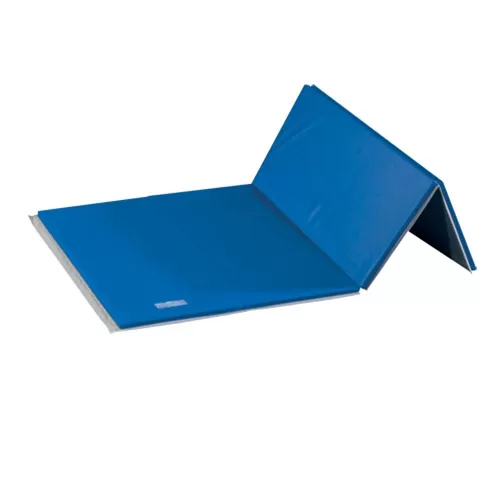 To receive the maximum level of cushioning in matting that’s usable for Pilates, consider the Fold-Up Gymnastic Mat. This mat measures 4 by 6 feet, making it the ideal size for one person to use for the groundwork required for Pilates. For those who want to cover a larger area, this style of mat is available in multiple sizes up to 6 by 12 feet and many can be connected together.
To receive the maximum level of cushioning in matting that’s usable for Pilates, consider the Fold-Up Gymnastic Mat. This mat measures 4 by 6 feet, making it the ideal size for one person to use for the groundwork required for Pilates. For those who want to cover a larger area, this style of mat is available in multiple sizes up to 6 by 12 feet and many can be connected together.
This vinyl covered mat has a core of polyethylene foam measuring 1.5 inches in thickness. Polyethylene foam compresses under the weight of people walking and landing on it before bouncing back to its original shape. This allows it to absorb the impact of athletes working out on it, protecting their lower body joints.
Each mat uses panels that will fold onto each other accordion-style, which simplifies the process of storing the mat after the workout session. The entire mat weighs only 18 pounds.
Select from more than a dozen color choices in the vinyl layer. The 18-ounce vinyl cover is durable enough to stand up to regular Pilates workouts without showing excessive wear.
Customer Sharon of Phoenix uses her mat six days per week, receiving stability and comfort.
The manufacturer makes these mats in the United States, so customers can trust the quality of the ingredients and the assembly process. The vinyl will be easy to clean, and it resists soaking up spilled water and sweat.
